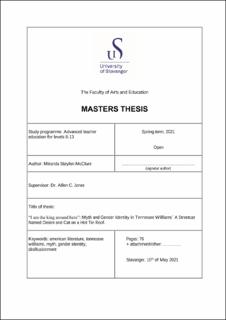"I am the king around here": Myth and Gender Identity in Tennessee Williams´ A Streetcar Named Desire and Cat on a Hot Tin Roof.
Master thesis
Permanent lenke
https://hdl.handle.net/11250/2779098Utgivelsesdato
2021Metadata
Vis full innførselSamlinger
- Student papers (HF-IKS) [770]
Sammendrag
American society is founded on myths such as the American Dream and Manifest Destiny. Tennessee Williams, an American, wrote plays that often contained subtle hints toward the supernatural and myth, yet the time-period of his plays is often the era of post-war disillusionment. In contrast to the post-war period of WWI, in which disillusionment resulted in a rejection of democracy in favour of ideology, the post-war period of WWII was existential rather than political. The post-WWII disillusionment consisted mainly of three things: existentialism, alienation and individual hopelessness. This thesis explores how myth and gender identity portray mid-century, post-war disillusionment in Tennessee Williams´ plays A Streetcar Named Desire (1947) and Cat on a Hot Tin Roof (1955). Williams created a compelling and innovative portrayal of characters who struggle with identity and sexuality. Juxtaposing concepts of myth and the portrayal of gender identity reveal how Williams´ characters attempt to transcend the primal urges of the body, yet are devoured by their own human nature. As a result, the characters develop paradoxical identities which cause them to experience and represent the alienation and existentialism that permeated the American society during the mid-century era. This thesis will explore how Brick Pollitt´s inability to define his sexual identity leads to homosexual existentialism and Blanche DuBois´s inability to develop her gender consciousness causes her to have a psychological breakdown. The similarities between these two characters is their paradoxical identities: Brick´s hetero- and homomasculine identity and Blanche´s belle/whore identity. Their paradoxical identities and their portrayal of mythical figures create new narratives, which casts Brick and Blanche as archetypal figures in their own right, and serves to make them icons for gender liberation.
